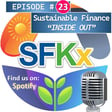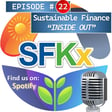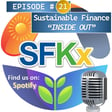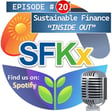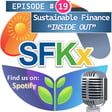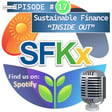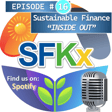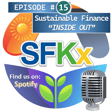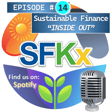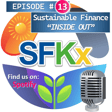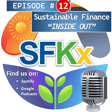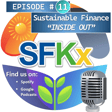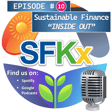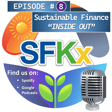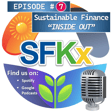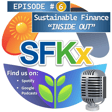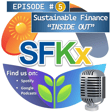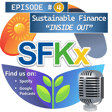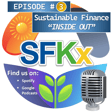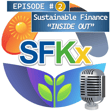Become a Creator today!Start creating today - Share your story with the world!
Start for free
00:00:00
00:00:01

Sustainable Finance Kx 'Inside Out' Podcast Episode 9
Transcript
Podcast Introduction and Milestone Celebration
00:00:07
Speaker
Hello, and welcome to Sustainable Finance KX, or Sustainable Finance Inside Out Podcast, where this is episode number nine, and just like a cat with nine lives, we always come back, land in our feet, and keep giving you a bit more. So episode number nine, and the big one, next one, number 10. Anyway, I won't faff about, as I say, I'll get to introduce you straight to my good mate, Sustainable Finance KX guru,
00:00:34
Speaker
and he'll bring you the latest news, events, major breakthroughs, key happenings in the super fast world of sustainable finance. Mr. Guru, over to you.
00:00:44
Speaker
Thank you. Thank you, SFDJ. And I'm so glad that we've shifted our joke vernacular to animals rather than bingo and other forms of elements in the world. So good to hear your voice. Good to be back. Good morning. Good afternoon. Good evening. Good salutation and everything in between to our listeners. Looking forward to getting to episode number 10. A few bits and pieces today. Let's dive right in.
Flat Market and ESG Issuance Outlook
00:01:14
Speaker
I guess a lot of expectations about the market this year, probably overall pretty flat. Where the overall at least bonds, not loans, we know the SLL market was 40, 50% down due to cyclical reasons. In terms of that bond side in various formats, close to 950 ish plus, be about the same this year, various things coming out to suggest that. Although January is super hot.
00:01:38
Speaker
hottest and biggest month ever in ESG, reflecting the overall market as well. And again, this is not a podcast to forecast the future in terms of bond volumes and things. We're really trying to focus on the sustainability part and draw key learnings out of the broader contest. But market was pretty strong in at least volume wise, and that was reflected in the ESG issuance numbers as
SLLs and New Developments in Finance
00:02:02
Speaker
well. We're expecting SLLs to sort of bounce back again.
00:02:05
Speaker
This year, blended finance, transition finance, also a lot of articles about those. SPTI, our science-based target initiatives, have really planted in some more resourcing. We should see a lot more corporates going for those certifications. Nuclear, we talked about last time, a little bit more coming in, even Ontario City over in Canada with a bond that they've done, adding FOTUM, doing some new stuff on their nuclear side.
00:02:32
Speaker
What have we got here?
Challenges in ESG Data and Principles
00:02:34
Speaker
I'm still some challenges on the ESG data side We know there's challenges around ratings and challenges now about implied temperature metrics. So look out Look out for those IKMA issued a pretty significant piece of work around transition guidance, but there's still no transition principles Let's see if that underpins any activity in the market green bond standard in the EU still waiting to see what happens there
00:02:58
Speaker
Their ISSB just released part one and two guidance for their upcoming standards.
00:03:04
Speaker
Oh, what else have we got here?
Biodiversity Projects in the UK
00:03:06
Speaker
Biodiversity, we'll talk a little bit about more in the next podcast, but some interesting things happening in the UK and a couple of instances of companies undertaking to repair through biodiversity positive activities in other parts of their business. If they've built something, if they've shifted that biodiversity, actually working with a party to go net nature positive somewhere else. So that's pretty interesting stuff there. Biodiversity credits are really going to come on.
Investment in Energy Transition
00:03:35
Speaker
Bloomberg released some of their annual, I'll just zoom in here, annual sort of green
00:03:42
Speaker
We should say global investment in the energy transition about 1.8 million, sorry, 1.8 trillion for 2023, climbing close to 20%. EVs are still the main driver there, clean technologies, renewables, all that standard sort of stuff. But as we've talked about in the podcast, climate tech is a really good forward-looking measure as to where these more developed parts of financing and products are going to head to.
00:04:09
Speaker
So if we look at sort of the main things, renewables, nuclear we've talked about, energy, sorry, let me just start with the main ones, renewables, electrified transport and power grids were the three main ones. And then if we look at the other bits and pieces, nuclear, storage, hydrogen,
00:04:27
Speaker
clean industry and I guess that's carbon capture, hydrogen and clean shipping.
Bloomberg's Sustainable Finance Outlook
00:04:32
Speaker
So all the stuff we sort of talk about in some guys under that transition banner. I mean, all these expenditures heading that way, which is good as that scales and scales and scales and scales. What that means is projects will be more mature and then there'll be a more of a large variety of financings from venture debt to other forms of debt. If we sort of do a bit of an outlook,
00:04:56
Speaker
let me have a look here you know the things that are going to grow according to Bloomberg significantly overcoming decades you know CCS carbon capture up 45 times nuclear 8.7 times again that nuclear nuclear nuclear word coming in hydrogen six times electrified transport 2.9 times grids 2.3 clean energy electrified heat 0.40. So again just really good
00:05:26
Speaker
forward-looking indicators of where we'll see the sustainable finance market start to fund a bit more.
Decline in ESG-linked Bonds and New Taxonomies
00:05:35
Speaker
Moving right along, SFTG, what else have we got? ESG-linked bonds, again, sort of dropping last year. We've talked about that a lot, Davos and other things. COP is a little bit behind us now and sort of looking out more to this year, more sustainable finance taxonomies coming out, the Indonesian one,
00:05:53
Speaker
came out a couple of weeks back. That was interesting because it still includes aspects of coal. It's a little bit of a head scratch. China's first transition to taxonomy, getting close to launching there. And then if we have a look at sort of an outlook, so we've looked at the expenditure side.
Top Environmental Finance Articles
00:06:13
Speaker
And that is a front runner to what we'll see sort of going forward in coming years. And a lot of that's under that transition banner. Environmental Finance, fantastic read. Recommend it to all of our listeners. Top 10 most read articles in 2023. I'll just whip through these, SFDJ.
00:06:31
Speaker
Linked bonds for ANL, TNFD on the nature side, disclosure metrics, EUGBS, green bond standards, ESG ratings, regulations, biodiversity risk, biodiversity credits, SFRD, can't even remember what that stands for now, but all the labeling of different funds in the US, sorry, in Europe, biodiversity funds, linked bonds and the debates around those.
00:06:58
Speaker
credit or carbon-linked bonds, outcomes-based financing, results-based financing, and Japan's green transformation bonds. So pretty interesting as a bit of a recap slasher, look forward to all of those issues going to weave into this year.
S&P's Risk and Sustainability Themes
00:07:14
Speaker
If we have a look at some of the things that S&P have come out with, again, physical risks highlighting the E and the S, the human health and climate being highlighted, disclosure standards,
00:07:27
Speaker
What else have we got here? AI and the impacts on that to sustainability. And again, they're sort of estimating a trillion trillion dollars. Narendra Tiwari, who I picked up from LinkedIn, came out with about seven or eight themes, integrated reporting.
00:07:45
Speaker
CSRD, corporate disclosures in the EU, there's so many different acronyms for that. Automated data collection, scope three emissions, sustainable supply chain, greenwashing regulations, ESG ratings and AI for sustainability. So lots of interesting things. Some of that will translate into funding. Some of that will translate into context, the stronger the context in and more enabling the context is.
00:08:11
Speaker
corporates need to do more and then the funding comes in as part of that. Just a couple more things to highlight SFTJ before I hand back to you.
Outcomes-based Financing Push
00:08:22
Speaker
HSBC turns out doing a fair bit of work on that climate tech side and working with Google and some others. Outcomes based financing, the World Bank is really pushing that. We'll talk about it in future
00:08:34
Speaker
podcast where it's on a milestone base, you reach a milestone, then you get something a little bit similar to some of the linked methodologies there. Massive expansion of renewables, again times three by 2030, energy efficiency times two by 2030, sort of carrying on from COP, the Transition Pathway Initiative coming out with some notes on food producers and Agri do check those out.
00:08:58
Speaker
I think again, it's the biodiversity, it's the nature, it's the ocean tech, it's the climate tech, it's the SPTI ramp ups, it's disclosures, it's taxonomies, it's hydrogen, it's CCS, all of those things. There's a couple of articles which you'll like.
00:09:16
Speaker
SFDJ in time to dust off the brown cords. The fashion industry has set the double emissions by 2030. Interestingly enough, we'll talk about in the next podcast we're preparing for. There's a standard and some references from ACT.
00:09:36
Speaker
transition methodologies coming out for luxury goods and fashion, so you'll be happy about those and can dust off your Gucci underpants as well there, SF DJ.
Transition Bonds in Japan
00:09:49
Speaker
Yeah, that takes us through in terms of the news, so a bit of a smattering of the smorgasbord as usual.
00:09:58
Speaker
You've certainly once again gone through the smorgasbord, you've gone through the jello, the mashed potatoes, the prime ribbon, probably the prawn cocktail too, SF Guru. So thanks for that very, very inclusive summary. Funny how you finished on fashion. You all know you love a loud shit, Mr. Guru. I've seen that pineapple and coconut on your wear now and then.
00:10:20
Speaker
That's one for the recycle bin, no doubt. Now, on more salient topics, linked instruments. Can you please update that for us, please, SF Guru?
00:10:34
Speaker
In terms of the link side of things, a couple of ones, Iberola, Spanish renewables firm did some link loans. They're presumably hooked to Generation, Alia. I think that did a linked bond over in Brazil. I think that's agri-connected, I may be wrong. We saw a bit of property action over in the UK, Fibra Uno. Also, I think Italian, I hope, some private equity and funds, EF, generally connected to emissions and gender.
00:11:03
Speaker
What else have we got here? Just one other one, Zengun. I must say, I forgot in my notes to check out what industry they're in, so not a whole lot of action on that link side, and it sort of speaks to the market that use of proceeds has come back with a vengeance we saw in the numbers last year, and it's really kicking off well this year, so just a small smattering, I should say, on the link side there.
00:11:30
Speaker
Thanks, Mr. Guru. One thing we did learn in that update is that your Italian pronunciation needs quite a bit of work, so maybe a few linguistic short causes should be coming your way. Anyway, thanks for that. Our next topic is always on this podcast is the highlights for use of instruments. Can you please give us the latest for use of instruments? Well, before that, I think I can say schwa and pronounce Noam Chomsky better than yourself, champ. Whoa, look at that.
00:11:59
Speaker
university days. But look back to the use of proceeds. So I really wanted to talk more about one deal in particular this month, but let's whip through the others. And then what we want to do is come back to an excellent piece that the Climate Bond Initiative released on the Japan transition bond. So let's really focus on that. But we'll whip through first UK talking about issuing again, BRI and
00:12:22
Speaker
Indonesia issuing again, Hong Kong issuing in some digital formats, and NAM who have issued in various formats and transition in green, opting for green bond this time, Potamina geothermal oil and gas in Indonesia related. Let me just scroll down here. What else have we seen?
00:12:41
Speaker
Uganda, sorry to jump back to sovereigns, we're jumping around a bit here. France, Qatar, Kenya, Austria, T Corp, New South Wales Treasury Corp, there's Zambia, had a bond in their local market, Serbia. If we look at banks again, sovereigns, agencies, MDBs, and banks, you know, really
00:13:03
Speaker
have the lion's share across the different products over 2023, and that seems to be continuing. But Nordia, ADB, NIB, Deutsche, Salanzbunki. What else have we got here? Santander in Chile, a whole bunch of other round banks, World Bank, State Bank of India, Construction Bank, BDO over in the Philippines. And then if we look at renewables,
00:13:34
Speaker
REC, AC Energy, Ennal, which we talked about already, Hafslund. I think that must be German there. If we then start cruising into utilities, again, pretty stock standards, but I will come back to that transition bond. Again, Brookfield, Linz, Greenalia,
00:13:58
Speaker
On the structured side, we saw some interesting things as well. Property, insurance, transport, and in-front. DBS was active in supporting some customers there. Some ECAs or export credit agency, a little bit of work there. Some data centers. POSCO over in Korea on the steel side issued a really interesting bond. You could probably even label that transition. So do check that out. Hong Kong airports and retail bonds. Telefonica on the Telco side.
00:14:27
Speaker
Uhm hurts on the ABS or securitization side which I couldn't quite remember for Ontario teachers gearing up some investments there. Some battery, and then the social side ox money and ADB supporting SML in Indonesia. If we just come back to the.
00:14:46
Speaker
to the transition bond for Japan, though, SFTJ. I just want to comment on a couple of things on that. So first of all, there was a lot of that bond process related to subsidies. And we know that there's a bit of a geopolitical or trade war and subsidies for hydrogen CCUS between EU green plants, between IRA plants in the US and now Japan and all sorts of different markets. And Australia is not immune to that either, looking at the hydrogen Head Start program.
00:15:14
Speaker
So, look, if you look at it, you know, 60-70% is really R&D for steel, for hydrogen, for all sorts of things in the subsidy programs as well, for things like contract for difference when you're producing hydrogen and you can't quite sell it for how much you cover your costs. So that, I think, is very significant.
00:15:37
Speaker
And it's something that we easily gloss over when we're talking about transition. Actually, still the R&D, still the subsidies and other things connected to kick-starting those products can still need to be funded. And this was a super cool way of doing that. The Climate Bond Initiative also highlighted five things which are whipped through. R&D to enable technological breakthroughs. Subsidies for establishing green activities and getting them on a stronger footing. Believe it or not, no gas-fired power generation was included.
00:16:06
Speaker
and I don't think there was nuclear either in that, nor is funding for operational coal fire power plants that partially replace coal with ammonia. I'll take a breath after that. So I guess some aspects of what's happening in Japan, this was a really safe sort of option, but it's cool. Subsidies, R&D, at scale, different interesting technology. Super cool, one of the more interesting bonds I've seen for some time.
00:16:33
Speaker
and then it just rounds off on the report R&D, renewable energy, low carbon transport, electrical grids and storage, building allocations of various things under that framework. So do check that out. One of the most interesting bonds I've seen for some time, still on a user proceeds basis.
00:16:50
Speaker
And I guess some people might say, well, can corporates do subsidies and things? Generally, it's government domain to offer subsidies to others. And R&D, as we know, traditionally, if you have a relatively developed set of R&D and you can capitalize on that within the term of a bond is generally OK. So good to see some different stages of R&D really, really focused around very direct things and solar cells and some other stuff I can't even pronounce.
00:17:17
Speaker
Super cool there SFDJ back to back to you. Thanks Guru another wonderful summary and yeah the Japanese certainly do things quite well don't they. Any country that gave us Mario Brothers is a good one in my book.
R&D and Subsidies in Green Bonds
00:17:33
Speaker
Now we're at the stage of our podcast always we come to our FAQs or frequently asked questions.
00:17:40
Speaker
these two for uh... for this uh... this one i must tell the second one says she was you touched on our indians previously uh... is if you are what we see a surgeon are indeed affiliate straightforward question then absolutely i thought you'd be a problem and more than a uh... mario brothers but that's not a rat podcast you know what i i think i and a and it really speaks to the point of saying i've seen it connected to nuclear a little bit on the r and a it's always been something that's looked
00:18:07
Speaker
hasn't been featured in many green bonds, I think it'll feature more in transition. So I think it's super cool. Traditionally, R&D, again, not super early, you know, there's scales of zero to nine if you're talking about commercialization of R&D. Traditionally, you'd see something more developed coming to fruition over the lifetime of a bond.
00:18:30
Speaker
Things like our companies like semiconductors that are naturally R&D heavy You might see a bigger allocation and use of proceeds bonds to those but governments including subsidies and other things I think that's super cool. So yeah, I think as we're seeing this subsidy and R&D boom towards Accelerating what's happening in transition and really starting to kickstart those markets I think we're gonna see a lot a lot more and hopefully we see that under a transition
00:19:00
Speaker
umbrella and we get money to more of these things. And we're seeing that everything we talked about on that climate tech and aspects of those can be funded under these debt markets, but some other structures and equity and all sorts of things can can really be used as well for that. So yeah, we will see more.
00:19:19
Speaker
Perfect, thanks Guru.
Future of Outcomes-based Finance
00:19:22
Speaker
One more question. This is a sort of a meaty question. You can also maybe explain the question as part of your answer if that's okay. But what we see, the question was will we see more outcomes based structures for sustainable finance?
00:19:34
Speaker
Yeah, I think we will. And it slipped my mind, but the World Bank has been pretty big on this and supporting a couple of transactions. There's been a recent plastics-linked loan in Vietnam. We've seen linked transactions or a linked bond for a school that were paying an amount. And if they could get the carbon credits for replacing
00:19:58
Speaker
certain heating and cooling and waste management, that would be a kicker back to the owners of that of that bond. So the results based climate, climate financing and there's some news acronyms, it's going to be called I think, innovation type financing coming out. And again, we've seen
00:20:19
Speaker
social impact bonds, climate impact bonds that are pay for success or you or me invest in something and take a 3% coupon. If an outcome has reached, carbon credits will be issued or a coupon will be increased. So lots of different things and maybe instead of giving money like a sustainability link loan,
00:20:42
Speaker
where all the money is given up front and then just the coupons adjusted along the way. We'll see more principal based structures whereby you might do 20% at the start after a certain milestone has reached another 20%. So results based pay for success and kickers in terms of
00:21:02
Speaker
using carbon credits and other elements based off a set of performance or a project that reaches a certain stage. But World Bank's starting to really push that and I think that's super cool and aspects of what we see going forward I think are going to sort of fit under this innovation umbrella. So next podcast or the one after that we'll talk about it's just slipped my mind of the acronym. I think it's called Results Based
00:21:27
Speaker
climate financing, RBCF, so do check that out. And we hopefully will see the World Bank push. You might just have dropped out there for a second, Mr Gero. Yeah. You're back? I am.
Sustainability in Daily Life
00:21:43
Speaker
Cool, it's very opportune because we're sort of coming to the last phase of our podcast at the moment, and this is where we sort of go a bit broader than just finance into the more broader space around, I guess, sustainability in general. So can you tell us about some of the products or programs that integrate sustainability into our day-to-day lives? Yeah, I'd say it's more sort of the same, and I've collected these from around the place, green leases for property, loans for EVs,
00:22:08
Speaker
loans for greenhouses, loans for housing, energy efficiency upgrades. And there's a pretty cool one in your neck of the woods in AU, their SFR DJ where there was a specific loan to fund buses for schools that I think they were hydrogen or electric.
00:22:27
Speaker
So pretty interesting in terms of some of these programs and I really like the programmatic element to these because you can scale them. You set them up once, you have a framework or documentation from the bank and then you really roll that out rather than having bespoke frameworks for each individual deal owned by the corporate. Sort of it's a program by bank and then you really deliver that to SMEs and others. So nothing earth shattering there but just
00:22:52
Speaker
some good ongoing programs and we'd invite all our bankers who are listening to think about programs, think about structuring something once and then really rolling it out. So back to you SF DJ and I think that's possibly our shortest podcast in our history of podcasts with everything sort of jammed in there.
00:23:14
Speaker
It certainly is. It's always a time for first. So this is actually a bit of a special podcast.
Closing Remarks and Social Media Engagement
00:23:19
Speaker
Instead of me giving you the closing, the closing speed, I'm going to hand it over to Mr. Guru because he's been asking me for eight episodes now. Can you please do the closing? So I'll hand it over to Guru, close it out Mr. Guru and I'll play the music when you're done.
00:23:33
Speaker
Easy champ, I think that bingo's gone to your head. But look, anyway, thanks listeners. Hang out for our 10th episode coming up in the next few weeks. That's all I've got time for today. We hope you like the podcast, the news with a bit of fun sprinkled. And really the reason we do this is to
00:23:51
Speaker
help highlight some transactions, highlight the context of what's happening around sustainable finance, because the more enablers, the more disclosures, the more we debate, the more we talk about, the more things that need funded, the more sustainable finance, which is good for anything.
00:24:06
Speaker
Check us out on Twitter or X or whatever we call that thing now, SUS Finance KX. Check us out on our website, lots of magnificent blogs, sustainablefinancekx.com, also on LinkedIn, Sustainable Finance KX. So from myself, SF Guru, and I presume SF DJ, we will catch you next time. Can't wait for the funk music to come on. What about a yee-haw as we finish? A yee-haw, I'll do it over the music.
